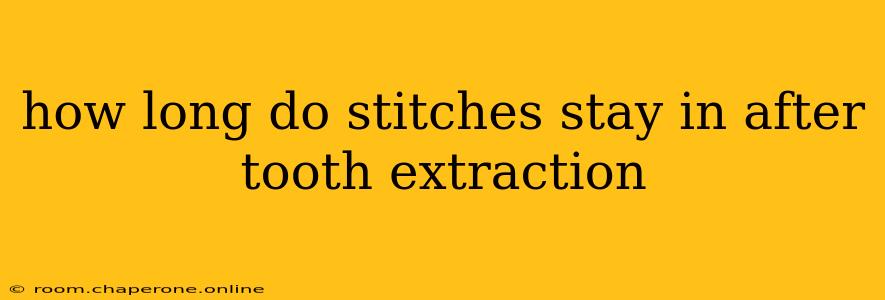Losing a tooth, whether through extraction or an accident, can be a concerning experience. One common question following a tooth extraction, especially a complex one, is: how long do stitches stay in? The answer, unfortunately, isn't a simple one-size-fits-all. The duration stitches remain in place depends on several factors, and understanding these factors is crucial for managing your recovery effectively.
Factors Affecting Stitch Removal Time After Tooth Extraction
Several key elements influence how long your stitches will need to stay in following a tooth extraction:
-
Complexity of the Extraction: Simple extractions, where the tooth is easily visible and removed, often require no stitches. More complex extractions, such as impacted wisdom teeth removal or those involving broken teeth, typically necessitate stitches to promote proper healing and reduce the risk of bleeding and infection. The more extensive the procedure, the longer the stitches are likely to stay.
-
Location of the Extraction: The location of the extraction site in the mouth also plays a role. Extractions in areas with greater blood supply or movement, such as the back of the mouth, may require longer healing times and therefore longer stitch retention.
-
Type of Stitches: Different types of stitches dissolve on their own (resorbable stitches), while others require removal by a dentist or oral surgeon. Resorbable stitches typically dissolve within a week to ten days, whereas non-resorbable stitches usually need to be removed by a dental professional after a specific healing period.
-
Individual Healing Rate: Each person heals at a unique pace. Factors like overall health, diet, and adherence to post-operative instructions significantly impact healing speed. Individuals with underlying health conditions or compromised immune systems may require longer healing times.
-
Post-Operative Complications: If complications arise, such as infection or excessive bleeding, the stitches might need to remain in place longer to facilitate appropriate healing.
Typical Timeframe for Stitch Removal
While there's no universal timeframe, most non-resorbable stitches are removed anywhere from 7 to 14 days post-extraction. However, your dentist or oral surgeon will provide specific instructions based on your individual case. It's crucial to attend your scheduled follow-up appointment to have them professionally removed. Attempting to remove them yourself can lead to complications, such as infection or further damage to the extraction site.
What to Expect During Stitch Removal
The process of removing stitches is generally quick and painless. Your dentist or oral surgeon will use small instruments to carefully remove the stitches. You may feel a slight tugging sensation, but it shouldn't be uncomfortable.
After Stitch Removal: The Healing Process Continues
Even after the stitches are removed, the healing process continues. It usually takes several weeks for the extraction site to fully heal. Following your dentist's post-operative instructions meticulously is crucial to ensure proper healing. This typically includes:
- Maintaining good oral hygiene: Gently brushing and rinsing your mouth, avoiding the extraction site directly.
- Following a soft food diet: Avoiding foods that are hard, crunchy, or require excessive chewing.
- Taking prescribed pain medication: To manage any discomfort.
- Avoiding smoking and alcohol: These substances can hinder the healing process.
When to Contact Your Dentist
Contact your dentist or oral surgeon immediately if you experience any of the following:
- Excessive bleeding: More than a slight oozing.
- Severe pain: Pain that is not controlled by prescribed medication.
- Signs of infection: Swelling, redness, or pus at the extraction site.
- Difficulty opening your mouth.
Disclaimer: This information is for general knowledge and informational purposes only, and does not constitute medical advice. Always consult with your dentist or oral surgeon for personalized advice regarding your specific situation and post-extraction care. They are the best source of information regarding your individual healing process and the appropriate timeframe for stitch removal.

